Intercultural Competence in Business MAR0131
VerifiedAdded on 2023/06/10
|12
|2604
|475
AI Summary
This report discusses intercultural competence in business, including cultural autobiography questionnaire, cultural framework, and similarities and differences among two biographies. It also covers the importance of maintaining equality in business and cultural diversity in the workplace.
Contribute Materials
Your contribution can guide someone’s learning journey. Share your
documents today.
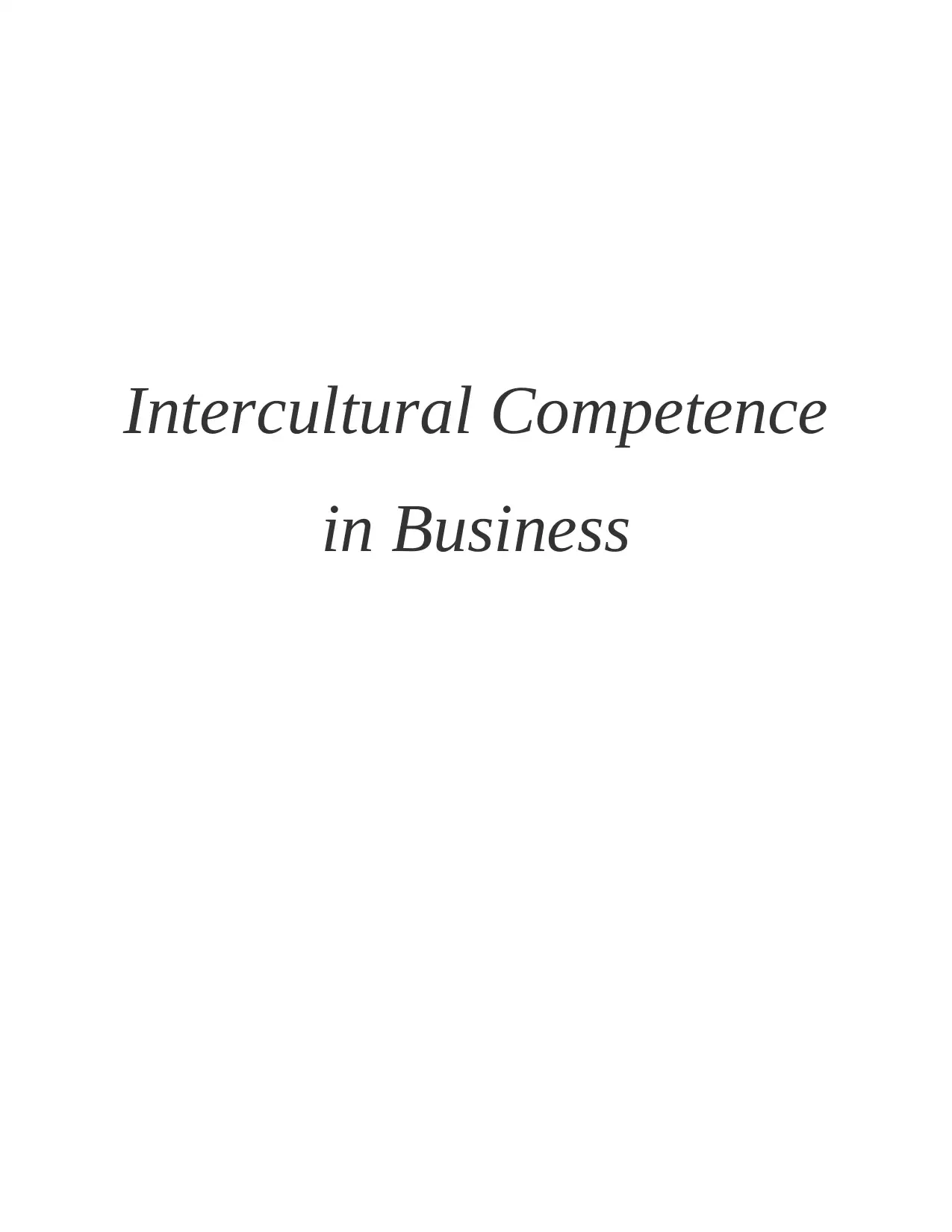
Intercultural Competence
in Business
in Business
Secure Best Marks with AI Grader
Need help grading? Try our AI Grader for instant feedback on your assignments.
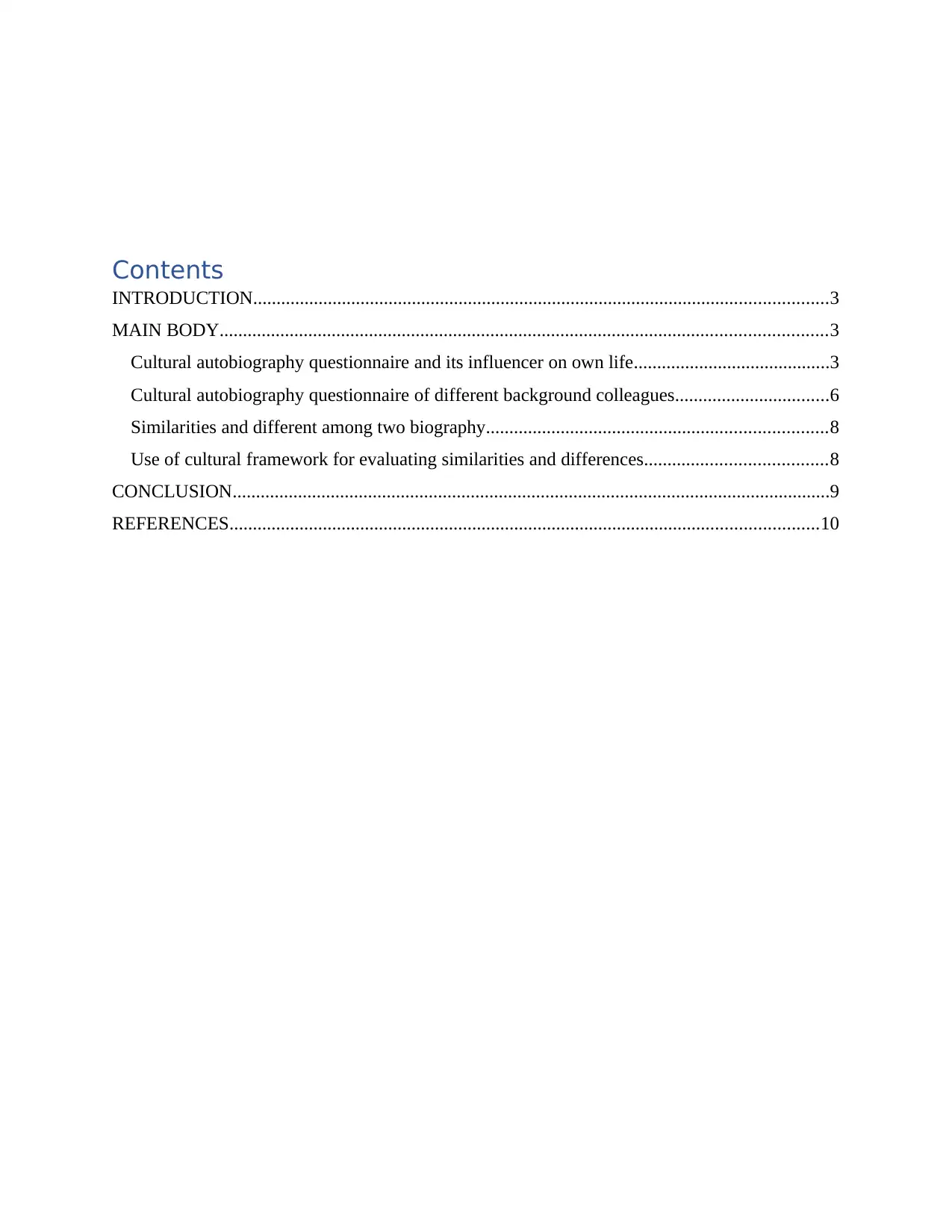
Contents
INTRODUCTION...........................................................................................................................3
MAIN BODY..................................................................................................................................3
Cultural autobiography questionnaire and its influencer on own life..........................................3
Cultural autobiography questionnaire of different background colleagues.................................6
Similarities and different among two biography.........................................................................8
Use of cultural framework for evaluating similarities and differences.......................................8
CONCLUSION................................................................................................................................9
REFERENCES..............................................................................................................................10
INTRODUCTION...........................................................................................................................3
MAIN BODY..................................................................................................................................3
Cultural autobiography questionnaire and its influencer on own life..........................................3
Cultural autobiography questionnaire of different background colleagues.................................6
Similarities and different among two biography.........................................................................8
Use of cultural framework for evaluating similarities and differences.......................................8
CONCLUSION................................................................................................................................9
REFERENCES..............................................................................................................................10
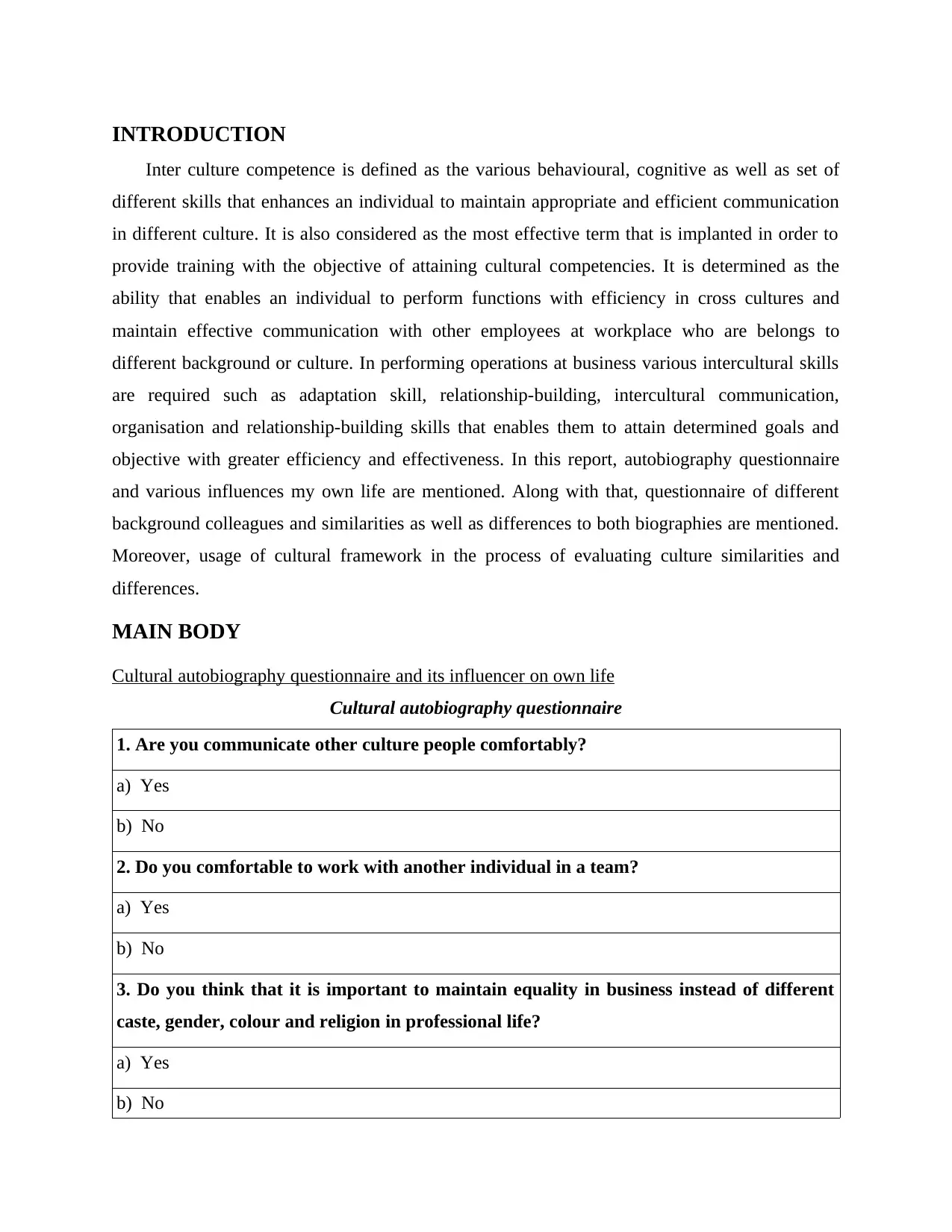
INTRODUCTION
Inter culture competence is defined as the various behavioural, cognitive as well as set of
different skills that enhances an individual to maintain appropriate and efficient communication
in different culture. It is also considered as the most effective term that is implanted in order to
provide training with the objective of attaining cultural competencies. It is determined as the
ability that enables an individual to perform functions with efficiency in cross cultures and
maintain effective communication with other employees at workplace who are belongs to
different background or culture. In performing operations at business various intercultural skills
are required such as adaptation skill, relationship-building, intercultural communication,
organisation and relationship-building skills that enables them to attain determined goals and
objective with greater efficiency and effectiveness. In this report, autobiography questionnaire
and various influences my own life are mentioned. Along with that, questionnaire of different
background colleagues and similarities as well as differences to both biographies are mentioned.
Moreover, usage of cultural framework in the process of evaluating culture similarities and
differences.
MAIN BODY
Cultural autobiography questionnaire and its influencer on own life
Cultural autobiography questionnaire
1. Are you communicate other culture people comfortably?
a) Yes
b) No
2. Do you comfortable to work with another individual in a team?
a) Yes
b) No
3. Do you think that it is important to maintain equality in business instead of different
caste, gender, colour and religion in professional life?
a) Yes
b) No
Inter culture competence is defined as the various behavioural, cognitive as well as set of
different skills that enhances an individual to maintain appropriate and efficient communication
in different culture. It is also considered as the most effective term that is implanted in order to
provide training with the objective of attaining cultural competencies. It is determined as the
ability that enables an individual to perform functions with efficiency in cross cultures and
maintain effective communication with other employees at workplace who are belongs to
different background or culture. In performing operations at business various intercultural skills
are required such as adaptation skill, relationship-building, intercultural communication,
organisation and relationship-building skills that enables them to attain determined goals and
objective with greater efficiency and effectiveness. In this report, autobiography questionnaire
and various influences my own life are mentioned. Along with that, questionnaire of different
background colleagues and similarities as well as differences to both biographies are mentioned.
Moreover, usage of cultural framework in the process of evaluating culture similarities and
differences.
MAIN BODY
Cultural autobiography questionnaire and its influencer on own life
Cultural autobiography questionnaire
1. Are you communicate other culture people comfortably?
a) Yes
b) No
2. Do you comfortable to work with another individual in a team?
a) Yes
b) No
3. Do you think that it is important to maintain equality in business instead of different
caste, gender, colour and religion in professional life?
a) Yes
b) No
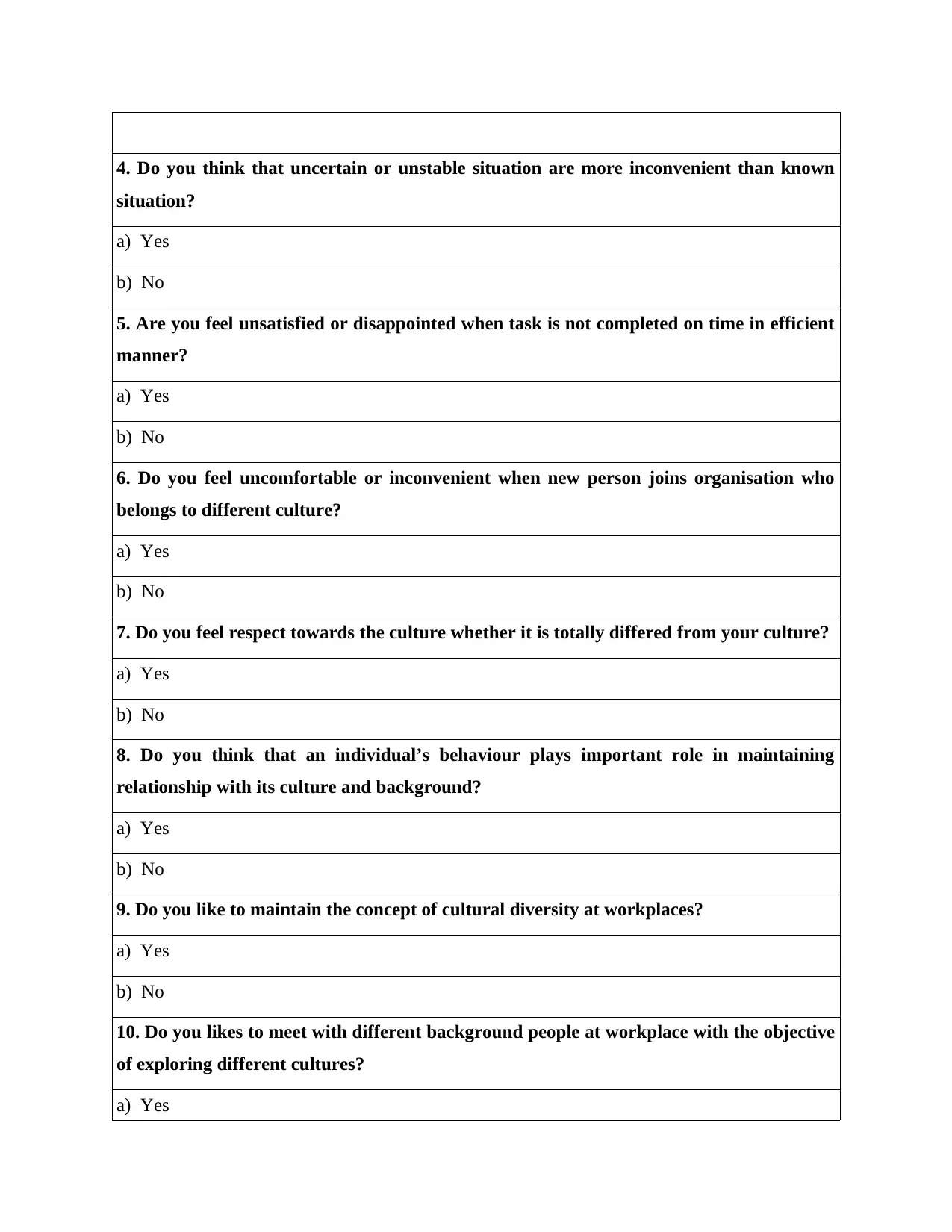
4. Do you think that uncertain or unstable situation are more inconvenient than known
situation?
a) Yes
b) No
5. Are you feel unsatisfied or disappointed when task is not completed on time in efficient
manner?
a) Yes
b) No
6. Do you feel uncomfortable or inconvenient when new person joins organisation who
belongs to different culture?
a) Yes
b) No
7. Do you feel respect towards the culture whether it is totally differed from your culture?
a) Yes
b) No
8. Do you think that an individual’s behaviour plays important role in maintaining
relationship with its culture and background?
a) Yes
b) No
9. Do you like to maintain the concept of cultural diversity at workplaces?
a) Yes
b) No
10. Do you likes to meet with different background people at workplace with the objective
of exploring different cultures?
a) Yes
situation?
a) Yes
b) No
5. Are you feel unsatisfied or disappointed when task is not completed on time in efficient
manner?
a) Yes
b) No
6. Do you feel uncomfortable or inconvenient when new person joins organisation who
belongs to different culture?
a) Yes
b) No
7. Do you feel respect towards the culture whether it is totally differed from your culture?
a) Yes
b) No
8. Do you think that an individual’s behaviour plays important role in maintaining
relationship with its culture and background?
a) Yes
b) No
9. Do you like to maintain the concept of cultural diversity at workplaces?
a) Yes
b) No
10. Do you likes to meet with different background people at workplace with the objective
of exploring different cultures?
a) Yes
Secure Best Marks with AI Grader
Need help grading? Try our AI Grader for instant feedback on your assignments.
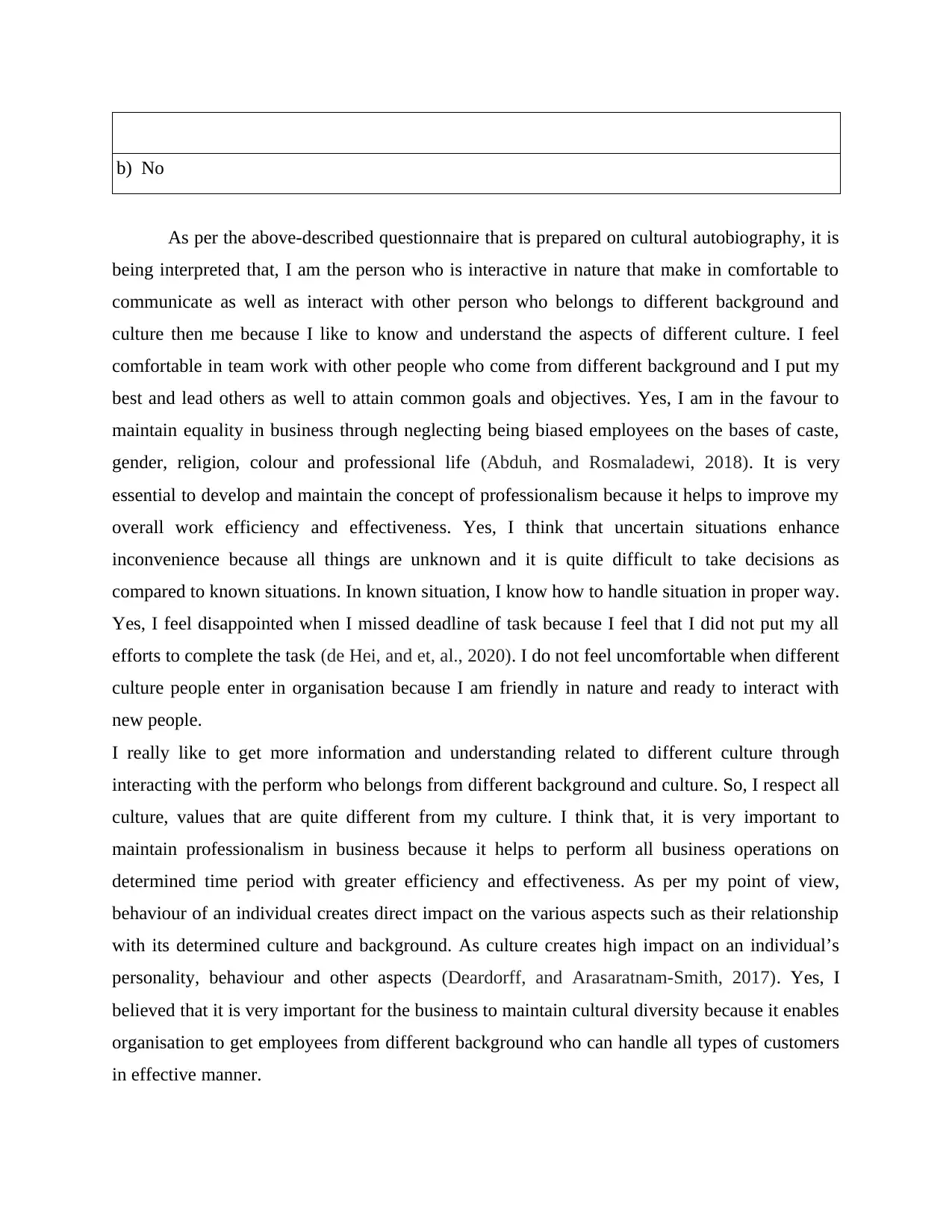
b) No
As per the above-described questionnaire that is prepared on cultural autobiography, it is
being interpreted that, I am the person who is interactive in nature that make in comfortable to
communicate as well as interact with other person who belongs to different background and
culture then me because I like to know and understand the aspects of different culture. I feel
comfortable in team work with other people who come from different background and I put my
best and lead others as well to attain common goals and objectives. Yes, I am in the favour to
maintain equality in business through neglecting being biased employees on the bases of caste,
gender, religion, colour and professional life (Abduh, and Rosmaladewi, 2018). It is very
essential to develop and maintain the concept of professionalism because it helps to improve my
overall work efficiency and effectiveness. Yes, I think that uncertain situations enhance
inconvenience because all things are unknown and it is quite difficult to take decisions as
compared to known situations. In known situation, I know how to handle situation in proper way.
Yes, I feel disappointed when I missed deadline of task because I feel that I did not put my all
efforts to complete the task (de Hei, and et, al., 2020). I do not feel uncomfortable when different
culture people enter in organisation because I am friendly in nature and ready to interact with
new people.
I really like to get more information and understanding related to different culture through
interacting with the perform who belongs from different background and culture. So, I respect all
culture, values that are quite different from my culture. I think that, it is very important to
maintain professionalism in business because it helps to perform all business operations on
determined time period with greater efficiency and effectiveness. As per my point of view,
behaviour of an individual creates direct impact on the various aspects such as their relationship
with its determined culture and background. As culture creates high impact on an individual’s
personality, behaviour and other aspects (Deardorff, and Arasaratnam-Smith, 2017). Yes, I
believed that it is very important for the business to maintain cultural diversity because it enables
organisation to get employees from different background who can handle all types of customers
in effective manner.
As per the above-described questionnaire that is prepared on cultural autobiography, it is
being interpreted that, I am the person who is interactive in nature that make in comfortable to
communicate as well as interact with other person who belongs to different background and
culture then me because I like to know and understand the aspects of different culture. I feel
comfortable in team work with other people who come from different background and I put my
best and lead others as well to attain common goals and objectives. Yes, I am in the favour to
maintain equality in business through neglecting being biased employees on the bases of caste,
gender, religion, colour and professional life (Abduh, and Rosmaladewi, 2018). It is very
essential to develop and maintain the concept of professionalism because it helps to improve my
overall work efficiency and effectiveness. Yes, I think that uncertain situations enhance
inconvenience because all things are unknown and it is quite difficult to take decisions as
compared to known situations. In known situation, I know how to handle situation in proper way.
Yes, I feel disappointed when I missed deadline of task because I feel that I did not put my all
efforts to complete the task (de Hei, and et, al., 2020). I do not feel uncomfortable when different
culture people enter in organisation because I am friendly in nature and ready to interact with
new people.
I really like to get more information and understanding related to different culture through
interacting with the perform who belongs from different background and culture. So, I respect all
culture, values that are quite different from my culture. I think that, it is very important to
maintain professionalism in business because it helps to perform all business operations on
determined time period with greater efficiency and effectiveness. As per my point of view,
behaviour of an individual creates direct impact on the various aspects such as their relationship
with its determined culture and background. As culture creates high impact on an individual’s
personality, behaviour and other aspects (Deardorff, and Arasaratnam-Smith, 2017). Yes, I
believed that it is very important for the business to maintain cultural diversity because it enables
organisation to get employees from different background who can handle all types of customers
in effective manner.
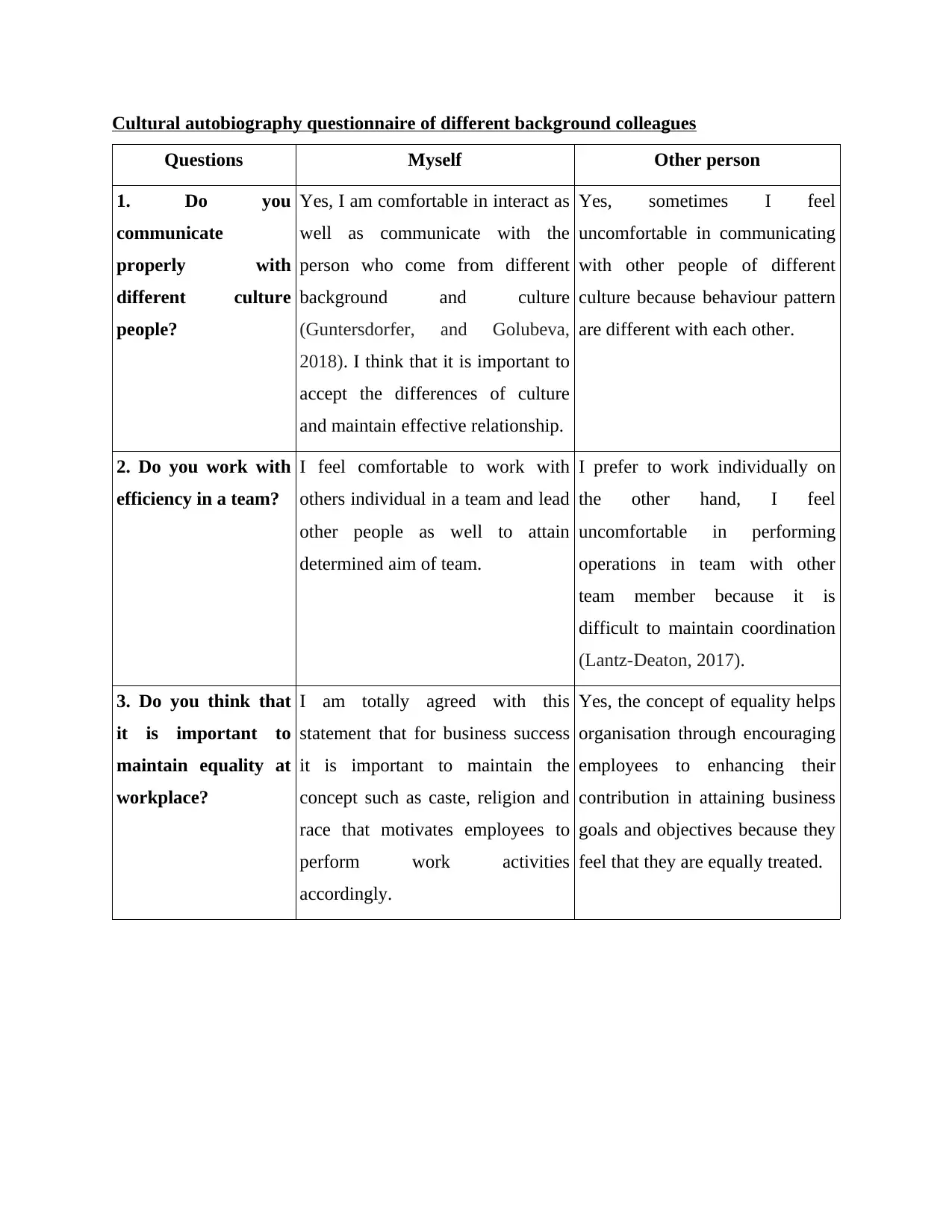
Cultural autobiography questionnaire of different background colleagues
Questions Myself Other person
1. Do you
communicate
properly with
different culture
people?
Yes, I am comfortable in interact as
well as communicate with the
person who come from different
background and culture
(Guntersdorfer, and Golubeva,
2018). I think that it is important to
accept the differences of culture
and maintain effective relationship.
Yes, sometimes I feel
uncomfortable in communicating
with other people of different
culture because behaviour pattern
are different with each other.
2. Do you work with
efficiency in a team?
I feel comfortable to work with
others individual in a team and lead
other people as well to attain
determined aim of team.
I prefer to work individually on
the other hand, I feel
uncomfortable in performing
operations in team with other
team member because it is
difficult to maintain coordination
(Lantz-Deaton, 2017).
3. Do you think that
it is important to
maintain equality at
workplace?
I am totally agreed with this
statement that for business success
it is important to maintain the
concept such as caste, religion and
race that motivates employees to
perform work activities
accordingly.
Yes, the concept of equality helps
organisation through encouraging
employees to enhancing their
contribution in attaining business
goals and objectives because they
feel that they are equally treated.
Questions Myself Other person
1. Do you
communicate
properly with
different culture
people?
Yes, I am comfortable in interact as
well as communicate with the
person who come from different
background and culture
(Guntersdorfer, and Golubeva,
2018). I think that it is important to
accept the differences of culture
and maintain effective relationship.
Yes, sometimes I feel
uncomfortable in communicating
with other people of different
culture because behaviour pattern
are different with each other.
2. Do you work with
efficiency in a team?
I feel comfortable to work with
others individual in a team and lead
other people as well to attain
determined aim of team.
I prefer to work individually on
the other hand, I feel
uncomfortable in performing
operations in team with other
team member because it is
difficult to maintain coordination
(Lantz-Deaton, 2017).
3. Do you think that
it is important to
maintain equality at
workplace?
I am totally agreed with this
statement that for business success
it is important to maintain the
concept such as caste, religion and
race that motivates employees to
perform work activities
accordingly.
Yes, the concept of equality helps
organisation through encouraging
employees to enhancing their
contribution in attaining business
goals and objectives because they
feel that they are equally treated.
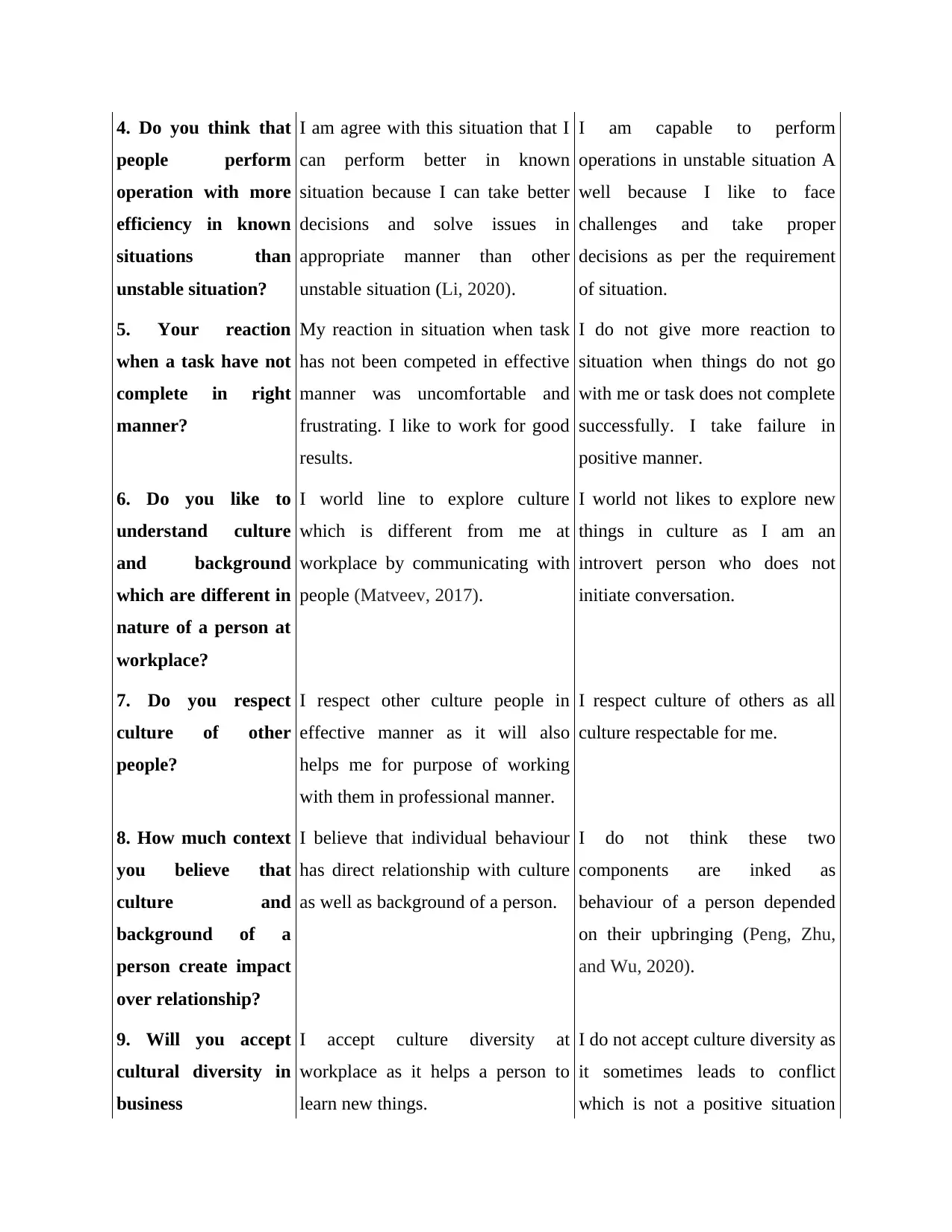
4. Do you think that
people perform
operation with more
efficiency in known
situations than
unstable situation?
I am agree with this situation that I
can perform better in known
situation because I can take better
decisions and solve issues in
appropriate manner than other
unstable situation (Li, 2020).
I am capable to perform
operations in unstable situation A
well because I like to face
challenges and take proper
decisions as per the requirement
of situation.
5. Your reaction
when a task have not
complete in right
manner?
My reaction in situation when task
has not been competed in effective
manner was uncomfortable and
frustrating. I like to work for good
results.
I do not give more reaction to
situation when things do not go
with me or task does not complete
successfully. I take failure in
positive manner.
6. Do you like to
understand culture
and background
which are different in
nature of a person at
workplace?
I world line to explore culture
which is different from me at
workplace by communicating with
people (Matveev, 2017).
I world not likes to explore new
things in culture as I am an
introvert person who does not
initiate conversation.
7. Do you respect
culture of other
people?
I respect other culture people in
effective manner as it will also
helps me for purpose of working
with them in professional manner.
I respect culture of others as all
culture respectable for me.
8. How much context
you believe that
culture and
background of a
person create impact
over relationship?
I believe that individual behaviour
has direct relationship with culture
as well as background of a person.
I do not think these two
components are inked as
behaviour of a person depended
on their upbringing (Peng, Zhu,
and Wu, 2020).
9. Will you accept
cultural diversity in
business
I accept culture diversity at
workplace as it helps a person to
learn new things.
I do not accept culture diversity as
it sometimes leads to conflict
which is not a positive situation
people perform
operation with more
efficiency in known
situations than
unstable situation?
I am agree with this situation that I
can perform better in known
situation because I can take better
decisions and solve issues in
appropriate manner than other
unstable situation (Li, 2020).
I am capable to perform
operations in unstable situation A
well because I like to face
challenges and take proper
decisions as per the requirement
of situation.
5. Your reaction
when a task have not
complete in right
manner?
My reaction in situation when task
has not been competed in effective
manner was uncomfortable and
frustrating. I like to work for good
results.
I do not give more reaction to
situation when things do not go
with me or task does not complete
successfully. I take failure in
positive manner.
6. Do you like to
understand culture
and background
which are different in
nature of a person at
workplace?
I world line to explore culture
which is different from me at
workplace by communicating with
people (Matveev, 2017).
I world not likes to explore new
things in culture as I am an
introvert person who does not
initiate conversation.
7. Do you respect
culture of other
people?
I respect other culture people in
effective manner as it will also
helps me for purpose of working
with them in professional manner.
I respect culture of others as all
culture respectable for me.
8. How much context
you believe that
culture and
background of a
person create impact
over relationship?
I believe that individual behaviour
has direct relationship with culture
as well as background of a person.
I do not think these two
components are inked as
behaviour of a person depended
on their upbringing (Peng, Zhu,
and Wu, 2020).
9. Will you accept
cultural diversity in
business
I accept culture diversity at
workplace as it helps a person to
learn new things.
I do not accept culture diversity as
it sometimes leads to conflict
which is not a positive situation
Paraphrase This Document
Need a fresh take? Get an instant paraphrase of this document with our AI Paraphraser
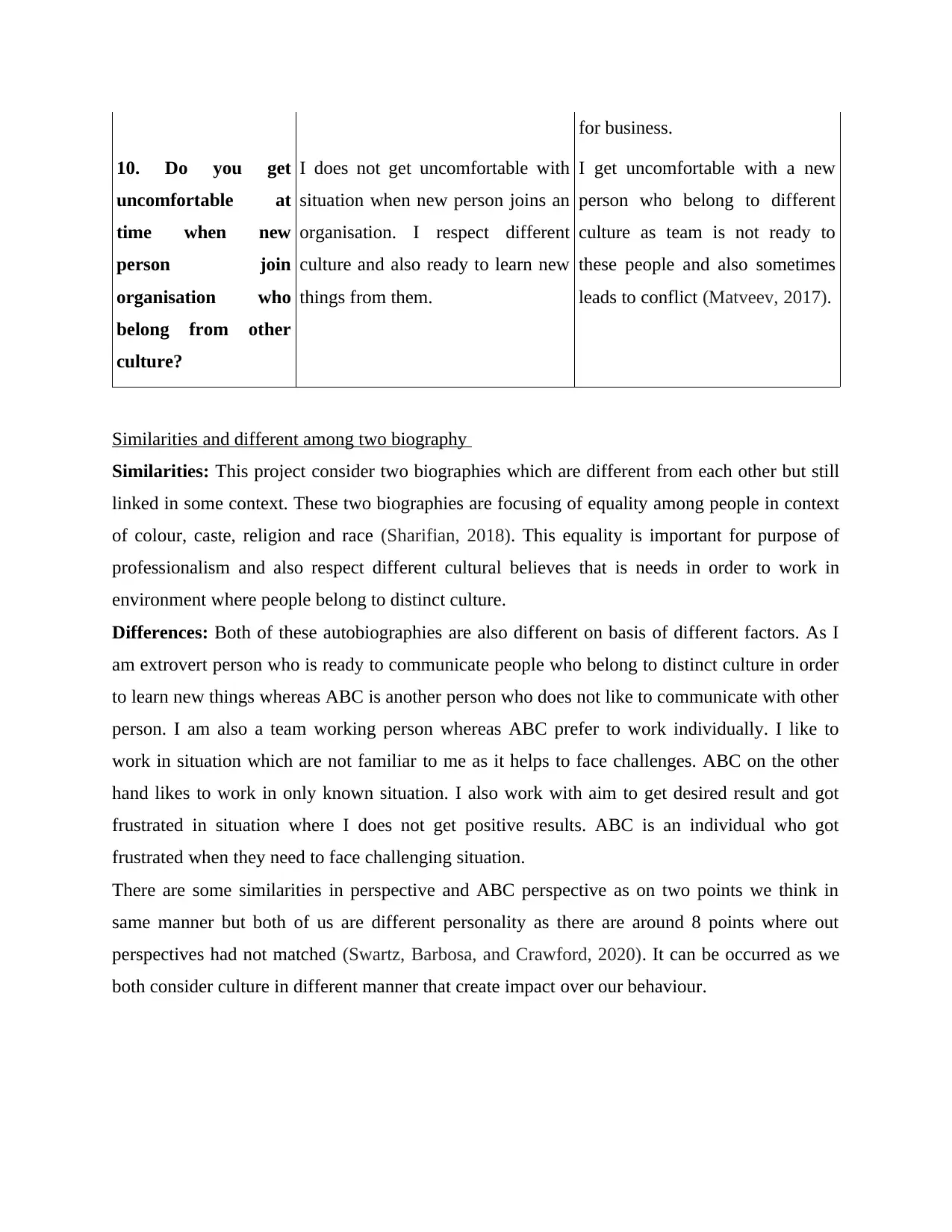
for business.
10. Do you get
uncomfortable at
time when new
person join
organisation who
belong from other
culture?
I does not get uncomfortable with
situation when new person joins an
organisation. I respect different
culture and also ready to learn new
things from them.
I get uncomfortable with a new
person who belong to different
culture as team is not ready to
these people and also sometimes
leads to conflict (Matveev, 2017).
Similarities and different among two biography
Similarities: This project consider two biographies which are different from each other but still
linked in some context. These two biographies are focusing of equality among people in context
of colour, caste, religion and race (Sharifian, 2018). This equality is important for purpose of
professionalism and also respect different cultural believes that is needs in order to work in
environment where people belong to distinct culture.
Differences: Both of these autobiographies are also different on basis of different factors. As I
am extrovert person who is ready to communicate people who belong to distinct culture in order
to learn new things whereas ABC is another person who does not like to communicate with other
person. I am also a team working person whereas ABC prefer to work individually. I like to
work in situation which are not familiar to me as it helps to face challenges. ABC on the other
hand likes to work in only known situation. I also work with aim to get desired result and got
frustrated in situation where I does not get positive results. ABC is an individual who got
frustrated when they need to face challenging situation.
There are some similarities in perspective and ABC perspective as on two points we think in
same manner but both of us are different personality as there are around 8 points where out
perspectives had not matched (Swartz, Barbosa, and Crawford, 2020). It can be occurred as we
both consider culture in different manner that create impact over our behaviour.
10. Do you get
uncomfortable at
time when new
person join
organisation who
belong from other
culture?
I does not get uncomfortable with
situation when new person joins an
organisation. I respect different
culture and also ready to learn new
things from them.
I get uncomfortable with a new
person who belong to different
culture as team is not ready to
these people and also sometimes
leads to conflict (Matveev, 2017).
Similarities and different among two biography
Similarities: This project consider two biographies which are different from each other but still
linked in some context. These two biographies are focusing of equality among people in context
of colour, caste, religion and race (Sharifian, 2018). This equality is important for purpose of
professionalism and also respect different cultural believes that is needs in order to work in
environment where people belong to distinct culture.
Differences: Both of these autobiographies are also different on basis of different factors. As I
am extrovert person who is ready to communicate people who belong to distinct culture in order
to learn new things whereas ABC is another person who does not like to communicate with other
person. I am also a team working person whereas ABC prefer to work individually. I like to
work in situation which are not familiar to me as it helps to face challenges. ABC on the other
hand likes to work in only known situation. I also work with aim to get desired result and got
frustrated in situation where I does not get positive results. ABC is an individual who got
frustrated when they need to face challenging situation.
There are some similarities in perspective and ABC perspective as on two points we think in
same manner but both of us are different personality as there are around 8 points where out
perspectives had not matched (Swartz, Barbosa, and Crawford, 2020). It can be occurred as we
both consider culture in different manner that create impact over our behaviour.
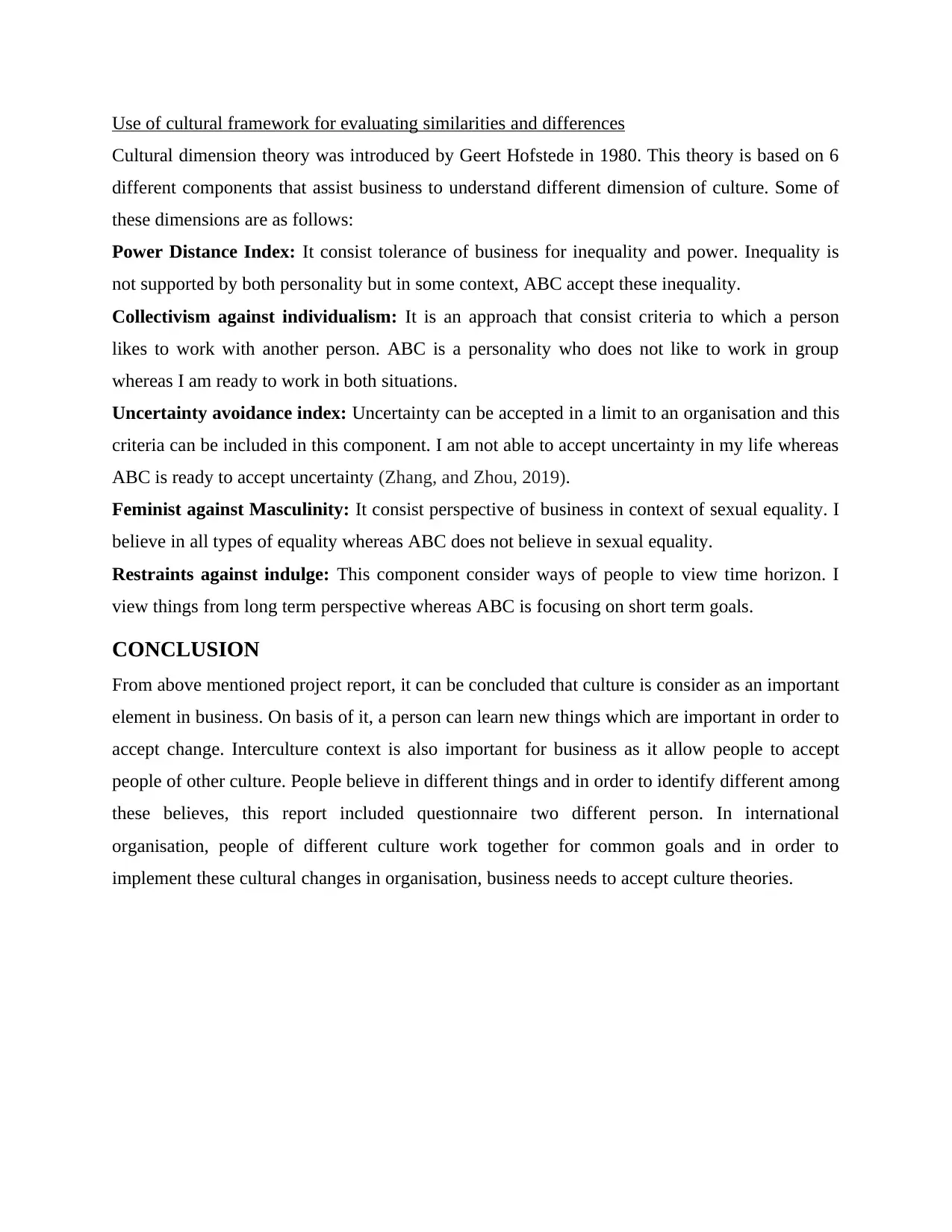
Use of cultural framework for evaluating similarities and differences
Cultural dimension theory was introduced by Geert Hofstede in 1980. This theory is based on 6
different components that assist business to understand different dimension of culture. Some of
these dimensions are as follows:
Power Distance Index: It consist tolerance of business for inequality and power. Inequality is
not supported by both personality but in some context, ABC accept these inequality.
Collectivism against individualism: It is an approach that consist criteria to which a person
likes to work with another person. ABC is a personality who does not like to work in group
whereas I am ready to work in both situations.
Uncertainty avoidance index: Uncertainty can be accepted in a limit to an organisation and this
criteria can be included in this component. I am not able to accept uncertainty in my life whereas
ABC is ready to accept uncertainty (Zhang, and Zhou, 2019).
Feminist against Masculinity: It consist perspective of business in context of sexual equality. I
believe in all types of equality whereas ABC does not believe in sexual equality.
Restraints against indulge: This component consider ways of people to view time horizon. I
view things from long term perspective whereas ABC is focusing on short term goals.
CONCLUSION
From above mentioned project report, it can be concluded that culture is consider as an important
element in business. On basis of it, a person can learn new things which are important in order to
accept change. Interculture context is also important for business as it allow people to accept
people of other culture. People believe in different things and in order to identify different among
these believes, this report included questionnaire two different person. In international
organisation, people of different culture work together for common goals and in order to
implement these cultural changes in organisation, business needs to accept culture theories.
Cultural dimension theory was introduced by Geert Hofstede in 1980. This theory is based on 6
different components that assist business to understand different dimension of culture. Some of
these dimensions are as follows:
Power Distance Index: It consist tolerance of business for inequality and power. Inequality is
not supported by both personality but in some context, ABC accept these inequality.
Collectivism against individualism: It is an approach that consist criteria to which a person
likes to work with another person. ABC is a personality who does not like to work in group
whereas I am ready to work in both situations.
Uncertainty avoidance index: Uncertainty can be accepted in a limit to an organisation and this
criteria can be included in this component. I am not able to accept uncertainty in my life whereas
ABC is ready to accept uncertainty (Zhang, and Zhou, 2019).
Feminist against Masculinity: It consist perspective of business in context of sexual equality. I
believe in all types of equality whereas ABC does not believe in sexual equality.
Restraints against indulge: This component consider ways of people to view time horizon. I
view things from long term perspective whereas ABC is focusing on short term goals.
CONCLUSION
From above mentioned project report, it can be concluded that culture is consider as an important
element in business. On basis of it, a person can learn new things which are important in order to
accept change. Interculture context is also important for business as it allow people to accept
people of other culture. People believe in different things and in order to identify different among
these believes, this report included questionnaire two different person. In international
organisation, people of different culture work together for common goals and in order to
implement these cultural changes in organisation, business needs to accept culture theories.
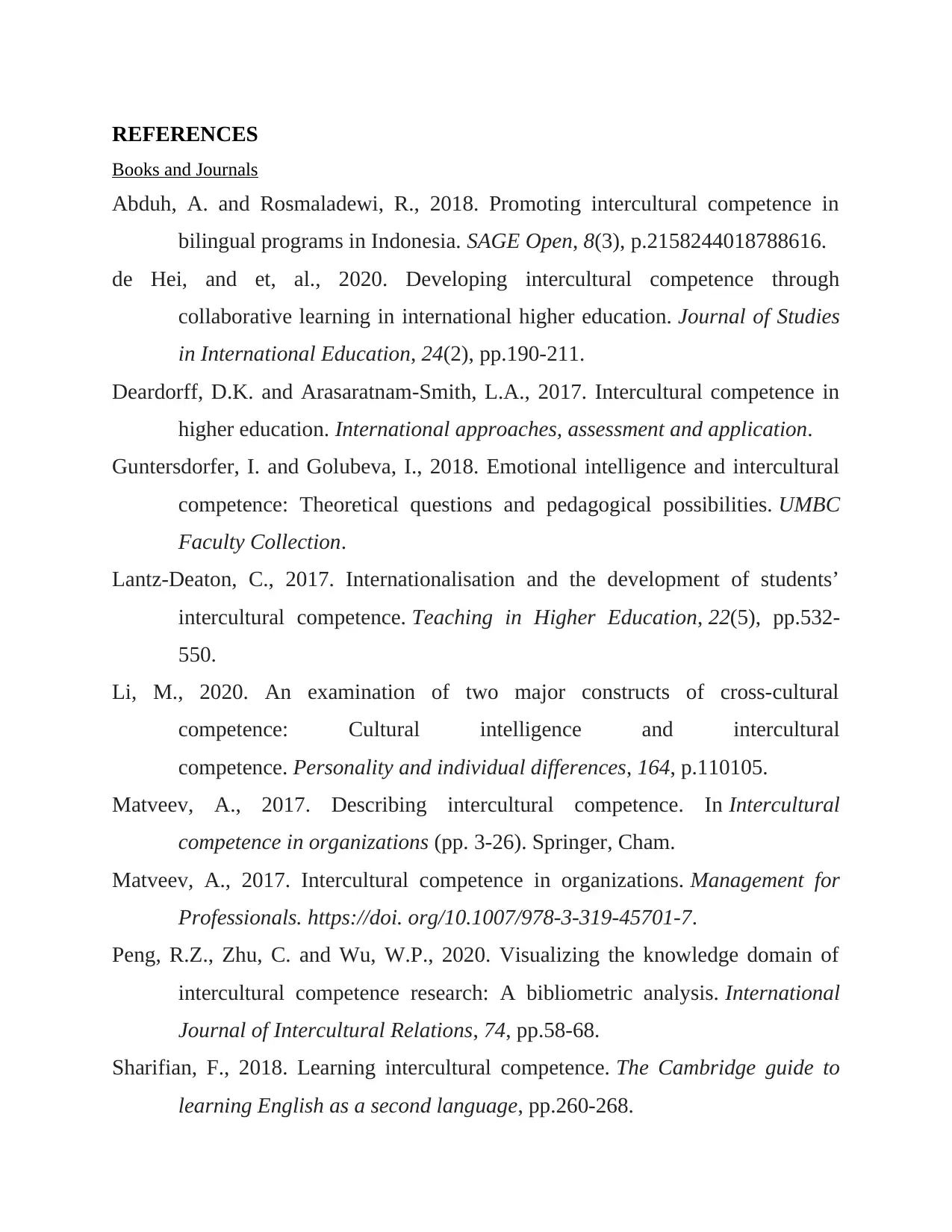
REFERENCES
Books and Journals
Abduh, A. and Rosmaladewi, R., 2018. Promoting intercultural competence in
bilingual programs in Indonesia. SAGE Open, 8(3), p.2158244018788616.
de Hei, and et, al., 2020. Developing intercultural competence through
collaborative learning in international higher education. Journal of Studies
in International Education, 24(2), pp.190-211.
Deardorff, D.K. and Arasaratnam-Smith, L.A., 2017. Intercultural competence in
higher education. International approaches, assessment and application.
Guntersdorfer, I. and Golubeva, I., 2018. Emotional intelligence and intercultural
competence: Theoretical questions and pedagogical possibilities. UMBC
Faculty Collection.
Lantz-Deaton, C., 2017. Internationalisation and the development of students’
intercultural competence. Teaching in Higher Education, 22(5), pp.532-
550.
Li, M., 2020. An examination of two major constructs of cross-cultural
competence: Cultural intelligence and intercultural
competence. Personality and individual differences, 164, p.110105.
Matveev, A., 2017. Describing intercultural competence. In Intercultural
competence in organizations (pp. 3-26). Springer, Cham.
Matveev, A., 2017. Intercultural competence in organizations. Management for
Professionals. https://doi. org/10.1007/978-3-319-45701-7.
Peng, R.Z., Zhu, C. and Wu, W.P., 2020. Visualizing the knowledge domain of
intercultural competence research: A bibliometric analysis. International
Journal of Intercultural Relations, 74, pp.58-68.
Sharifian, F., 2018. Learning intercultural competence. The Cambridge guide to
learning English as a second language, pp.260-268.
Books and Journals
Abduh, A. and Rosmaladewi, R., 2018. Promoting intercultural competence in
bilingual programs in Indonesia. SAGE Open, 8(3), p.2158244018788616.
de Hei, and et, al., 2020. Developing intercultural competence through
collaborative learning in international higher education. Journal of Studies
in International Education, 24(2), pp.190-211.
Deardorff, D.K. and Arasaratnam-Smith, L.A., 2017. Intercultural competence in
higher education. International approaches, assessment and application.
Guntersdorfer, I. and Golubeva, I., 2018. Emotional intelligence and intercultural
competence: Theoretical questions and pedagogical possibilities. UMBC
Faculty Collection.
Lantz-Deaton, C., 2017. Internationalisation and the development of students’
intercultural competence. Teaching in Higher Education, 22(5), pp.532-
550.
Li, M., 2020. An examination of two major constructs of cross-cultural
competence: Cultural intelligence and intercultural
competence. Personality and individual differences, 164, p.110105.
Matveev, A., 2017. Describing intercultural competence. In Intercultural
competence in organizations (pp. 3-26). Springer, Cham.
Matveev, A., 2017. Intercultural competence in organizations. Management for
Professionals. https://doi. org/10.1007/978-3-319-45701-7.
Peng, R.Z., Zhu, C. and Wu, W.P., 2020. Visualizing the knowledge domain of
intercultural competence research: A bibliometric analysis. International
Journal of Intercultural Relations, 74, pp.58-68.
Sharifian, F., 2018. Learning intercultural competence. The Cambridge guide to
learning English as a second language, pp.260-268.
Secure Best Marks with AI Grader
Need help grading? Try our AI Grader for instant feedback on your assignments.
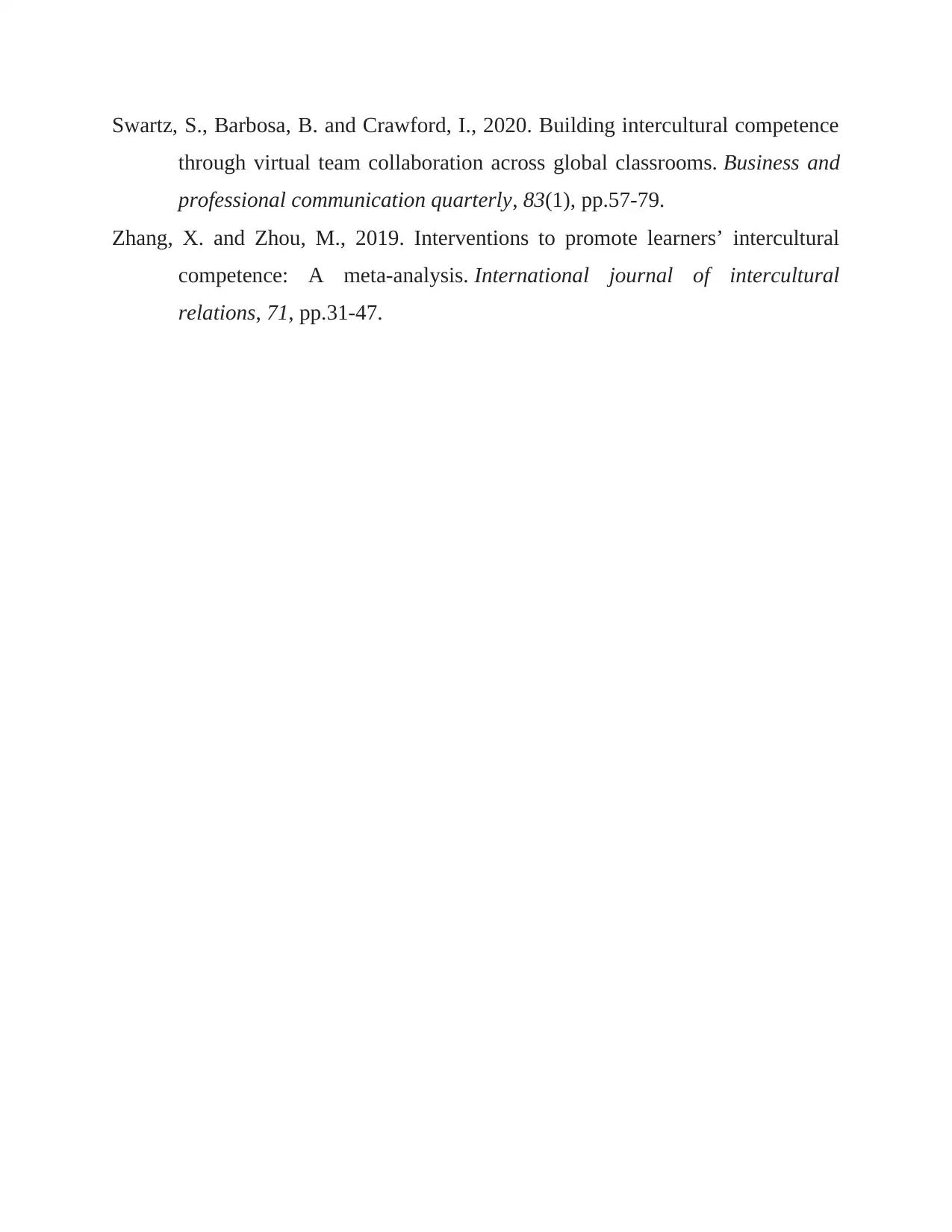
Swartz, S., Barbosa, B. and Crawford, I., 2020. Building intercultural competence
through virtual team collaboration across global classrooms. Business and
professional communication quarterly, 83(1), pp.57-79.
Zhang, X. and Zhou, M., 2019. Interventions to promote learners’ intercultural
competence: A meta-analysis. International journal of intercultural
relations, 71, pp.31-47.
through virtual team collaboration across global classrooms. Business and
professional communication quarterly, 83(1), pp.57-79.
Zhang, X. and Zhou, M., 2019. Interventions to promote learners’ intercultural
competence: A meta-analysis. International journal of intercultural
relations, 71, pp.31-47.

1 out of 12
Related Documents
Your All-in-One AI-Powered Toolkit for Academic Success.
+13062052269
info@desklib.com
Available 24*7 on WhatsApp / Email
![[object Object]](/_next/static/media/star-bottom.7253800d.svg)
Unlock your academic potential
© 2024 | Zucol Services PVT LTD | All rights reserved.




